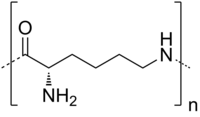
Photo from wikipedia
Pathogens in the food and environment pose a great threat to human health. To solve this problem, we described a novel route to synthesize antibacterial epsilon-poly-L-lysine (EPL) anchored dicarboxyl cellulose… Click to show full abstract
Pathogens in the food and environment pose a great threat to human health. To solve this problem, we described a novel route to synthesize antibacterial epsilon-poly-L-lysine (EPL) anchored dicarboxyl cellulose beads. Cellulose beads were prepared via a sol-gel transition method and oxidized by sodium periodate and sodium chlorite to form carboxyl groups. EPL was anchored on the beads using carbodiimide mediated amidation. The structure and morphology of beads were characterized by FTIR, XPS, XRD, SEM, and TGA. After dissolution and regeneration, the crystalline form of cellulose is transformed from cellulose I to cellulose II. The thermal degradation temperature of the beads is 200∼300 °C.The samples displayed excellent antimicrobial activity against Staphylococcus aureus, Alicyclobacillus acidoterrestris and Escherichia coli within 12 h. The beads could be biodegraded in soil after 20 days. The biodegradable beads exhibited great potential in food and environmental applications.
Journal Title: Carbohydrate polymers
Year Published: 2021
Link to full text (if available)
Share on Social Media: Sign Up to like & get
recommendations!